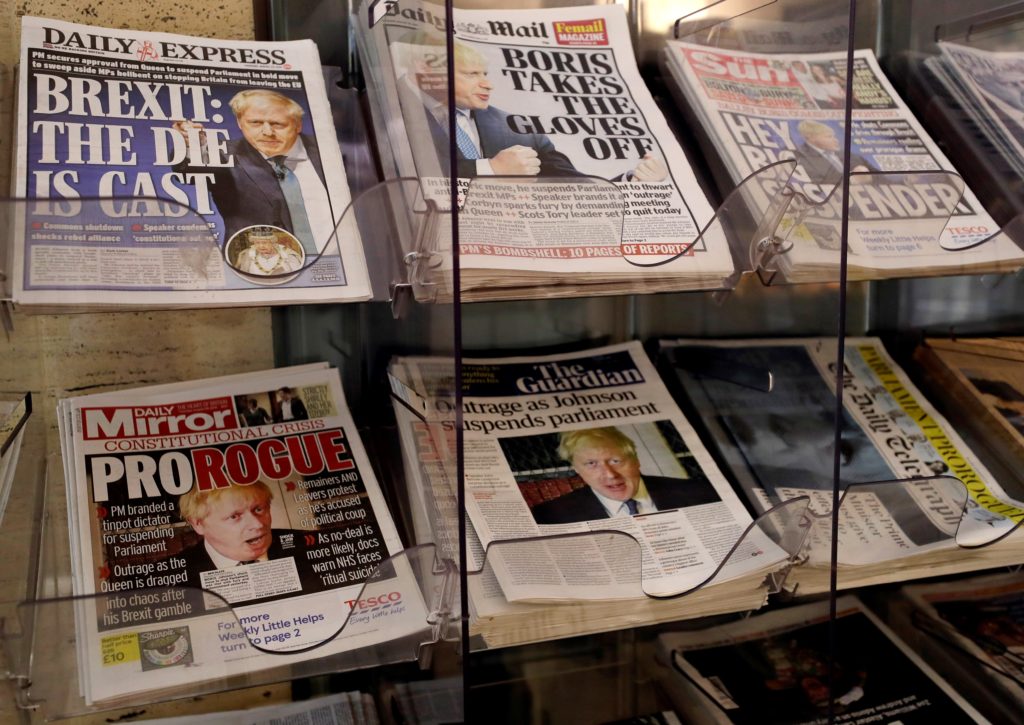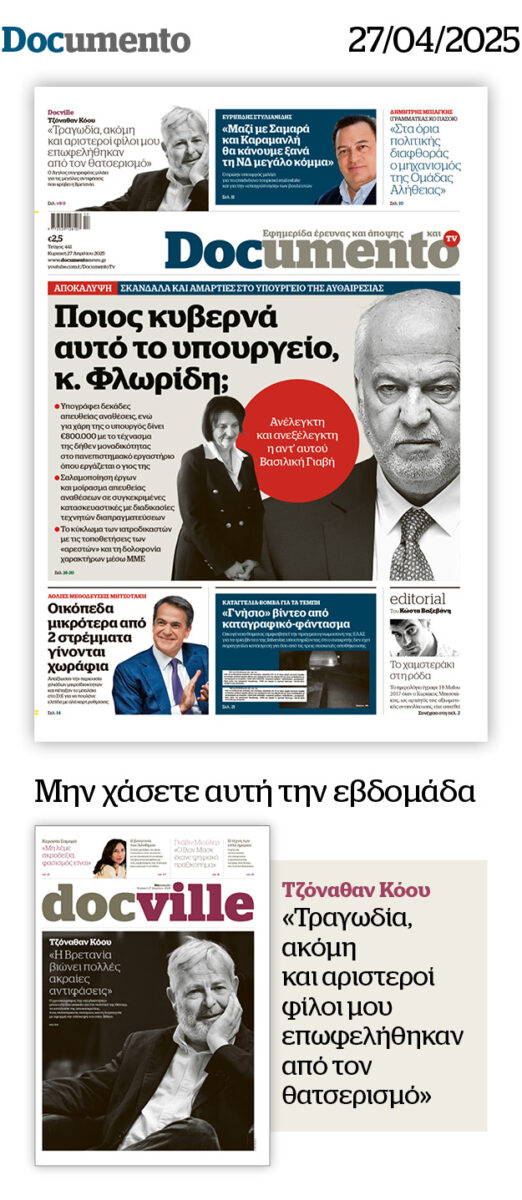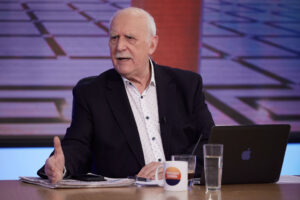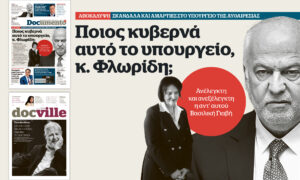Το σημερινό πρόβλημα της Δημοσιογραφίας και της δημοσιογραφικής κάλυψης των γεγονότων μέσα στο νεοφιλελεύθερο και απολυταρχικό δεξιό περιβάλλον, θέτει ο βρετανικός όμιλος VICE με άρθρο του Paul Mason στην ιστοσελίδα vice.com.
Με αφορμή την ίδια του την μακρόχρονη εμπειρία ο Paul Mason αναφέρεται στο Documento και τον εκδότη του, Κώστα Βαξεβάνη όπως και στην Efsyn ως εναλλακτικές λύσεις απέναντι στη δημοσιογραφία των ολιγαρχών και των συντηρητικών πολιτικών, σημειώνοντας πως το ίδιο το «ψέμα» έχει αλλάξει!
Όπως αναφέρει:
«Τι θα κάνουμε; Εάν ο Μπόρις Τζόνσον κερδίσει τις εκλογές, θα χρειαστούμε το είδος του εναλλακτικού μέσου που υπάρχει στην Ελλάδα, όπου οι ολιγάρχες κυριαρχούν στα ιδιωτικά ΜΜΕ: σοβαρή διαδικτυακή τηλεόραση και σταθμούς ραδιοφώνου, με ζωντανά τηλεφωνήματα και συζητήσεις, ποιοτικές εφημερίδες όπως η Efsyn, μια συνεταιριστική εφημερίδα από απολυμένους δημοσιογράφους φιλελεύθερης εφημερίδας και ερευνητικά έντυπα όπως το Documento, του οποίου ο εκδότης Κώστας Βαξεβάνης έχει επαλειμμένα οδηγηθεί στα δικαστήρια αποκαλύπτοντας σκάνδαλα διαφθοράς.»
Τι αναφέρει στο άρθρο του:
Ο δημοσιογράφος αφηγείται την εμπειρία του στην Μολδαβία, όπου παρακολουθώντας τα νέα και τις συνεντεύξεις από τις γειτονικές χώρες, Ουκρανία, Γεωργία, Αζερμπαιτζάν αντιλήφθηκε πως μιμούνται το BBC όπου «ένας ασπρομάλλης δημοσιογράφος κάνει σκληρές ερωτήσεις σε σπουδαία πρόσωπα για να λάβει πολεμοχαρείς απαντήσεις.»
«Αλλά όλα ήταν θέατρο» σημειώνει «ώστε να δοθεί η ψευδαίσθηση ενός ελεύθερου ΜΜΕ ενώ οι διεφθαρμένοι ολιγάρχες κινούν τα νήματα από πίσω».
«Σκέφτηκα τότε – συνεχίζει- πως εάν η Βρετανική Δημοκρατία διαβρωθεί, δεν θα το καταλαβαίναμε από τις εκπομπές της τηλεόρασης».
Σαν παράδειγμα έφερε μια συνέντευξη του επικεφαλής των Συντηρητικών, Μπόρις Τζόνσον στον δημοσιογράφο Andrew Marr.
«Στο τέλος ήταν ένα θέαμα δύο μεσοαστών λευκών που ο ένας φώναζε στον άλλο», λέει , «αλλά τελικά το BBC επέτρεψε στον Τζόνσον να πει τέσσερα “χειρουργικά” ψέματα».
Και τα απαριθμεί:
1. Ότι οι Εργατικοί θέλουν την αποχώρηση από το ΝΑΤΟ (αλλά δεν το θέλουν), 2 Ότι ο Τζέρεμι Κόρπιν (σ.σ. επικεφαλής των Εργατικών) θέλει να διαλύσει την MI5 (σ.σ. υπηρεσία αντικατασκοπείας και ασφάλειας του Ηνωμένου Βασιλείου – αλλά δεν το θέλει), 3. Ότι η παιδική φτώχεια έχει μειωθεί την τελευταία δεκαετία (αυξήθηκε κατά 400.000 από το 2011) και 4. Ότι το Κοινοβούλιο καταψήφισε την Ομιλία της Βασίλισσας (Υπερψηφίστηκε με 16 ψήφους διαφορά).
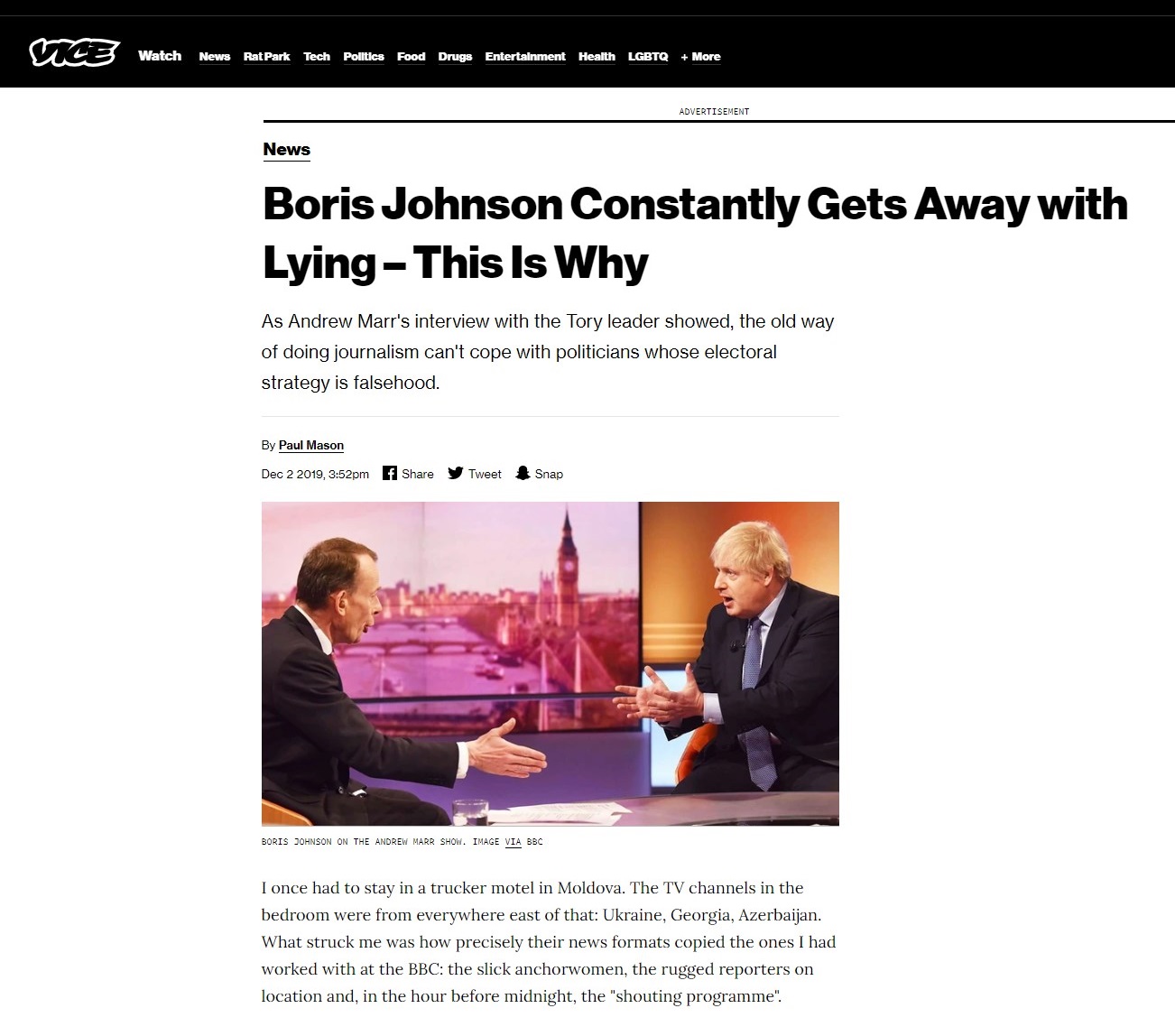
Συνεχίζοντας αναφέρει πως στο BBC, μεταξύ του 2001 και του 2013 διόρθωναν ψευδείς ειδήσεις σε πραγματικό χρόνο. Έσβηναν ολόκληρα βίντεο και τα επεξεργάζονταν ξανά σε τρομερούς χρόνους, απλά για μερικά μικρά λάθη.
Και προσθέτει:
«Σήμερα το πρόβλημα είναι διαφορετικής τάξης: Δεν έχουμε να κάνουμε με λάθη. Έχουμε να κάνουμε με την ελίτ των συντηρητικών πολιτικών των οποίων η στρατηγική τους είναι το ψέμα. Και όπως έδειξε η συνέντευξη του Marr, η καθιερωμένη δημοσιογραφική στρατηγική δεν αποδίδει.
Η Απολυταρχική Δεξιά μας μιλά τώρα μέσα από ένα προσεκτικά δομημένο δωμάτιο με ηχώ
Η Απολυταρχική Δεξιά μας μιλά τώρα μέσα από ένα προσεκτικά δομημένο δωμάτιο με ηχώ, όπου φανατικές ιστοσελίδες ερασιτεχνών, δεξιά tabloids, σκοτεινές δεξαμενές σκέψεις παραλαμβάνουν κάθε ψέμα, το απλοποιούν έως ότου γίνει αποδεκτό και μετά αναγκάζουν ευυπόληπτα πρακτορεία ειδήσεων να απαντήσουν σαν να είναι αλήθειες.»
Στη συνέχεια ο δημοσιογράφος προσπαθεί να βρει τη λύση:
«Τι θα κάνουμε; Εάν ο Μπόρις Τζόνσον κερδίσει τις εκλογές, θα χρειαστούμε το είδος του εναλλακτικού μέσου που υπάρχει στην Ελλάδα, όπου οι ολιγάρχες κυριαρχούν στα ιδιωτικά ΜΜΕ: σοβαρή διαδικτυακή τηλεόραση και σταθμούς ραδιοφώνου, με ζωντανά τηλεφωνήματα και συζητήσεις, ποιοτικές εφημερίδες όπως η Efsyn, μια συνεταιριστική εφημερίδα από απολυμένους δημοσιογράφους φιλελεύθερης εφημερίδας και ερευνητικά έντυπα όπως το Documento, του οποίου ο εκδότης Κώστας Βαξεβάνης έχει επαλειμμένα οδηγηθεί στα δικαστήρια αποκαλύπτοντας σκάνδαλα διαφθοράς.»
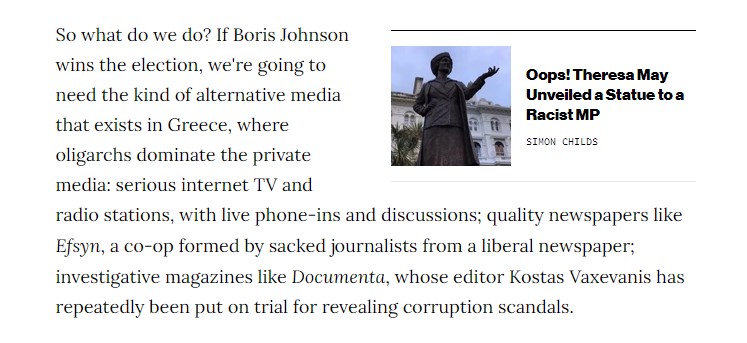
Διαβάστε όλο το άρθρο στην ιστοσελίδα του VICE
Διαβάστε το άρθρο στα αγγλικά, όπως έχει δημοσιευθεί στην vice.com
Boris Johnson Constantly Gets Away with Lying – This Is Why
As Andrew Marr’s interview with the Tory leader showed, the old way of doing journalism can’t cope with politicians whose electoral strategy is falsehood.
By Paul Mason
Dec 2 2019, 3:52pm
I once had to stay in a trucker motel in Moldova. The TV channels in the bedroom were from everywhere east of that: Ukraine, Georgia, Azerbaijan. What struck me was how precisely their news formats copied the ones I had worked with at the BBC: the slick anchorwomen, the rugged reporters on location and, in the hour before midnight, the “shouting programme”.
Just as on BBC Newsnight, a silver-haired veteran journalist threw tough questions at political bigwigs, and they threw belligerent answers back. But it was all theatre, designed to present the illusion of a free media while corrupt oligarchs ran things behind the scenes.
As I flicked through the channels, I remember thinking, ‘If Britain’s democracy is ever eroded we might not notice it from the TV output.’ Interviewers would still ask tough questions; politicians would still shout back at them – but none of it would matter.
Sadly, that’s what I started to feel watching Andrew Marr’s interview with Boris Johnson on Sunday.
Marr struggled to get a word in, as Johnson blustered and bluffed. By the end it was just the spectacle of two middle class white men shouting at each other. But in the process, the BBC had allowed Johnson to tell four finely crafted lies.
First: that Labour wants to withdraw from NATO (it doesn’t). Second: that Jeremy Corbyn wants to disband MI5 (he doesn’t). Third: that child poverty has fallen in the last ten years (it has risen by 400,000 since 2011). Fourth: that Parliament had blocked the Queen’s Speech (it was passed with a 16 vote majority).
When I worked for the BBC, between 2001 and 2013, it was drummed into us that we had to correct falsehoods in real time. We would scrap entire videos, or re-edit them on tape at furious speed, just because some minor detail was wrong.
Today, the problem is of a different order: we are no longer dealing with mistakes. We are dealing with a conservative political elite whose core strategy is falsehood. And – as Marr’s interview showed – the normal journalistic strategies are not working.
The authoritarian right now speaks to us through a carefully constructed echo chamber, where partisan amateur news websites, right-wing tabloids and shady “think-tanks” take any given lie, amplify it until it becomes accepted and then force reputable news outlets to respond to it as if it were true.
The problem for the broadcasters is acute. They are not set up for a situation where a major mainstream party is prepared to abandon truth as the playing field of politics, and where the tabloid press plays a willing part in peddling falsehood.
If they were, Marr would have said to Johnson: “I’m sorry, Prime Minister, you are systematically lying to me in this interview and I am going to read out the facts…” And the next news bulletin would have started: “The Prime Minister lied four times today…”
But it’s not individuals who are at fault. The entire profession of journalism has been trained to say with confidence: “This is the truth.” It’s another thing altogether to say, “This is a lie,” especially if it’s the Prime Minister saying it.
As if to underline the problem, the BBC’s Editorial Policy boss David Jordan put out a statement saying that, while the corporation might identify falsehoods, they were not in the business of identifying politicians as liars, because this was “for the audience to decide”.
So what do we do? If Boris Johnson wins the election, we’re going to need the kind of alternative media that exists in Greece, where oligarchs dominate the private media: serious internet TV and radio stations, with live phone-ins and discussions; quality newspapers like Efsyn, a co-op formed by sacked journalists from a liberal newspaper; investigative magazines like Documenta, whose editor Kostas Vaxevanis has repeatedly been put on trial for revealing corruption scandals.
But the central problem is the relationship between three players: the public broadcasters, the newspapers and the state itself.
In a functioning democracy, the state accepts the need for the free flow of information in order to uphold the rule of law and inform the electorate; the newspapers, even while politically partisan, expose the wrongdoing and hypocrisy on all sides; meanwhile, the public broadcasters are there to maintain a neutral space, set standards of behaviour, “to inform and educate” – as the BBC puts it – as well as to entertain.
But if you suddenly have a political class determined to ignore these implicit rules, and newspaper journalists willing to act as propagandists for one side, then the broadcast media has to adapt its own behaviour.
Most of the broadcast journalists I talk to privately are appalled at the way Johnson has tried to manipulate the media. But let me explain bluntly what they’re up against. The BBC operates a promotion system based on personal favours and networks. Though all jobs are advertised, everyone on the inside knows from which small shortlist the applicant will be chosen, because there’s a side-process of “chats” over coffee with senior managers, and even outright lobbying.
Even so, there’s a lot of room for talented people to move through that system on one condition: you do not rock the boat. People who rock the boat do not get promoted; they are accused of “having an agenda”; their journalism becomes a percentages game: how much crap do I have to produce to get away with one good exposé? And because the pay of senior onscreen journalists – and their managers – is spectacularly good, there is always a lot to lose.
The ultimate problem for the broadcasters is that they have no theory of ideology. You won’t complete an A-level Media course without hearing the word “ideology”: the proposal that prevalent ideas in society are products of their time and tend to support the position of elites. But not once in a 30-year career have I ever heard a TV editor ask: “Are we being too ideological here?”
It’s like trying to be a scientist without acknowledging there’s a scientific method to follow. It’s a self-imposed blindness to their own social status.
The result is that the broadcasters, despite being regulated for impartiality, systematically spread the ideology they were taught on the PPE course at Oxford: the middle way is best, the free market is the best system, sycophantic deference to Royalty and – fatally – that if the government says something it has to be reported and assumed to be true.
For the last ten days of the election, we need to “be our own media”. Yes, some TV programmes – above all, my former bosses at Channel 4 News – are doing their best to expose the strategy of falsehood. But the mindset and culture across much of news broadcasting makes it easier to default to stenography.
@paulmasonnews

